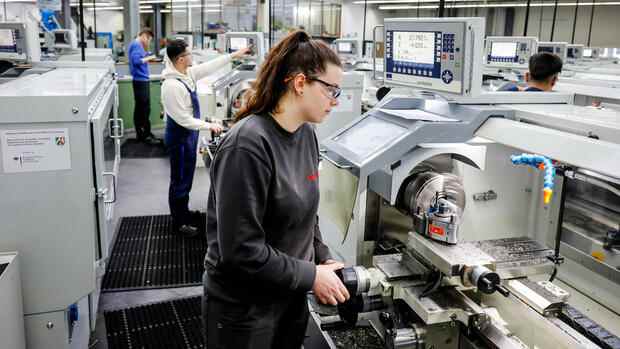So far, the German economy has been able to master all crises.
(Photo: imago images/Rupert Oberhäuser)
“It’s still going well.” This motto seems to determine German politics. Reunification, new economy bubble, euro crisis. The German economy has repeatedly succeeded in regaining its old strength. Of course, not all companies and sectors have always made it, but the others were all the stronger. The world export champion rushed from success to success.
Meanwhile, politicians concentrated on distributing the wealth generated and regularly testing the resilience of the economy with all sorts of more and mostly less sensible interventions. Even that could not prevent success, only make it more difficult.
Shaped by the experiences of the past decades, the federal government seems convinced that the German economy will manage to overcome the current crisis and then build on past successes. This is the only way to explain their actions and political priorities.
From half-baked relief packages without a clear effect, to the willingness to further reduce supply by shutting down nuclear power plants after electricity prices have increased twentyfold, to the foreseeable approval of new European joint debts.
Top jobs of the day
Find the best jobs now and
be notified by email.
This time, the danger that it will not end well is very real. Even without a war, the decline was foreseeable: Industry has been in retreat since 2019, companies in Germany have been investing less for years, and the infrastructure, digitization and education deficits are glaring. The working population is beginning to shrink, and there are no increases in productivity.
Daniel Stelter is the founder of the discussion forum beyond the obvious, which specializes in strategy and macroeconomics, as well as a management consultant and author. Every Sunday his podcast goes online at www.think-bto.com.
(Photo: Robert Recker/ Berlin)
Combined with a constantly growing tax burden and a policy that sees itself as a guide and undermines the principles of the market economy, Germany has long ceased to be an attractive location.
Foreign investments, such as those made by Tesla near Berlin, are often associated with significant subsidies and give the country a false sense of security.
We urgently need a real turning point. A real restart in economic policy, a fundamental reform of the state, the tax and levy system and the willingness to acknowledge that we have failed with our climate and energy policy.
>> Read here: Forests, moors, bodies of water: Environment Minister Lemke presents the natural climate protection action program
For the at least 2000 billion euros that the path to climate neutrality is likely to cost Germany, we could halve global CO2 emissions. After all, the global average cost of offsetting one ton of CO2 is 100 dollars compared to the 2,500 euros that we have to spend in Germany.
Inexpensive and reliable energy supply is the basis for everything. It is of little use to the global climate if the same production takes place somewhere else than here.
Our policy lacks the knowledge, the willingness and probably also the ability to initiate the turnaround. We threaten to go knocked out. It is high time that the economy protested loudly.
More: “Risk of a recession significant”: Why the German economy is one of the big losers in the crisis
